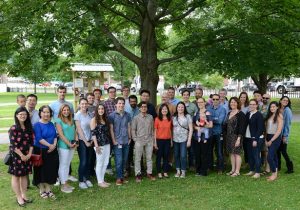The Optics in Medicine research cluster involves several independent research groups based at the Thayer School of Engineering at Dartmouth the Dartmouth-Hitchcock Health system and the Geisel School of Medicine at Dartmouth. The research involves studies related to tissue spectroscopy and imaging using both visible and near-infrared light where novel devices, software and methods provide insight into healthcare needs and discovery of disease processes.

Rooted in the scientific explorations of imaging and spectroscopy, each research projects is targeted to design a fundamentally new way to sense tissue status. The imaging technologies developed by the lab are used to characterize cancer tumors, track or guide therapies, or diagnose disease. Application areas include surgical guidance, radiation therapy, photodynamic therapy, and collaborations are formed throughout surgery, medicine, orthopaedics, radiology and dermatology.
Where we’re based.
Optics in Medicine Laboratories are distributed throughout collaborating programs with most applied research conducted at the Dartmouth Hitchcock Medical Center , with partners the Geisel School of Medicine at Dartmouth, the Norris Cotton Cancer Center, and Dartmouth’s Art and Sciences Graduate Programs. These facilities enable lab members to conduct interdisciplinary research that draws upon many aspects of the STEM (science, technology, engineering, and mathematics) disciplines.
, with partners the Geisel School of Medicine at Dartmouth, the Norris Cotton Cancer Center, and Dartmouth’s Art and Sciences Graduate Programs. These facilities enable lab members to conduct interdisciplinary research that draws upon many aspects of the STEM (science, technology, engineering, and mathematics) disciplines.
In addition to the multidisciplinary identity of Dartmouth’s Optics in Medicine Laboratories, the groups are also engaged in research partnerships with other educational institutions as well as private-sector entities. These partnerships not only promote research collaboration within academia, but also allow the laboratory to develop, market, and produce medical technologies that can be used in clinical settings.
How we’re funded.
Funding comes from a number of governmental organizations including National Institute of Health (NIH), its National Institute of Biomedical Imaging and Bioengineering (NIBIB), the National Cancer Institute (NCI), the National Institute of Neurological Disorders and Stroke, and the Congressionally Directed Medical Research Program of the Department of Defense. The funds awarded by these organizations are used to develop new medical technologies that strengthen cancer treatment regimes and improve the prognosis of a number of aggressive tumors. Pilot funds have come from the Norris Cotton Cancer Center and the ACS Pilot funds, as well as the Hitchcock Foundation.